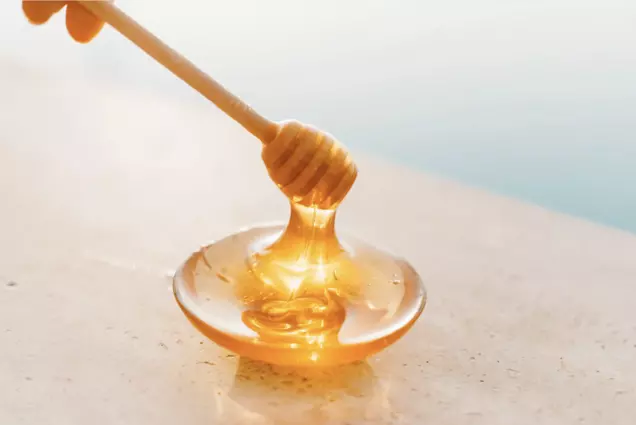Can Dogs Eat Honey?
- 21 Dec 2023
- 4m read

Yes, dogs can eat honey in controlled quantities.
Is Honey Good for Dogs?
Yes, honey is good for dogs.
Honey, a familiar household staple for many, is not only a delightful treat for humans but also holds several health benefits for our furry friends. In moderation, it can indeed be a beneficial addition to your dog's diet, as a natural source of vitamins, minerals, and antioxidants.
Rich source of nutrients
Honey is a natural source of essential nutrients, including vitamins, minerals, and antioxidants. Just as we prioritise a balanced diet for ourselves, adding a small amount of honey to your dog's meals can contribute to their overall well-being.
Quick energy boost
The natural sugars present in honey provide a quick and easily digestible source of energy. This makes honey an excellent option for active dogs, offering a natural and efficient way to fuel their daily adventures and activities.
Antimicrobial properties
One of the remarkable features of honey is its antimicrobial properties. It has been recognised for its ability to inhibit the growth of certain bacteria, making it beneficial for minor wound care.
Applying honey to cuts or abrasions can aid in the healing process.
Soothing for kennel cough
Honey's soothing properties extend to the respiratory system, making it a popular choice for managing symptoms of kennel cough in dogs. The sticky consistency of honey helps coat the throat, providing relief from coughing.
While it may not be a cure, it can offer comfort during the recovery period.
Potential allergy relief
Some dogs may experience seasonal allergies, and locally sourced honey might offer relief. The theory is that exposure to small amounts of local pollen in honey may help build tolerance and reduce allergy symptoms.
However, it's essential to consult with your vet before using honey as a remedy for allergies.
Respiratory health support
Apart from its role in managing coughs, honey's natural properties can contribute to overall respiratory health. The antimicrobial components may assist in maintaining a healthy respiratory system in dogs.
Can Dogs Eat Manuka Honey?
Yes, dogs can eat Manuka honey.
Manuka honey, renowned for its potent antibacterial properties, is safe for dogs in moderation. However, it's essential to choose high-quality, authentic Manuka honey.
Can I Give My Dog Honey for Kennel Cough?
Yes, you can give dogs honey to help with kennel cough.
Honey's soothing properties make it a popular choice for managing symptoms of kennel cough in dogs. The sticky consistency helps coat the throat, providing relief from coughing.
While honey can be a complementary remedy, it is not a substitute for professional veterinary care. If your dog is displaying symptoms of kennel cough, consult with your vet for guidance on the best course of action.
Can Dogs Have 100% Raw Honey?
Yes, dogs can eat 100% raw honey.
Opting for 100% raw and unfiltered varieties ensures that your dog receives the maximum nutritional benefits. Raw honey retains its natural enzymes, antioxidants, and vitamins, making it a wholesome addition to your dog's diet.
How Much Honey Can I Give My Dog?
While honey can be a nutritious treat, it's essential to control the portion size. Limit the amount of honey you give to your dog. A small drizzle or a teaspoon occasionally should be sufficient.
Too much honey can contribute to excessive calorie intake and potential weight gain. Small amounts of honey, as an occasional treat, can provide your dog with a tasty and healthful experience.
Considerations When Giving Honey to Dogs
Before introducing honey into your dog's diet, consider any existing health conditions or dietary restrictions.
Choose the right honey
Opt for high-quality, pure, and raw honey. Avoid honey with added sugars or artificial additives. Raw honey retains more of its natural enzymes and antioxidants, providing potential health benefits.
Allergies
Before introducing honey into your dog's diet, it's advisable to check for any allergies or sensitivities as some dogs may have allergies to bee products. Start with a small amount and monitor your dog for any adverse reactions. If you notice itching, digestive upset, or other signs of discomfort, discontinue use and consult with your vet.
Avoid certain types of honey
Some varieties of honey may contain toxins harmful to dogs. For example, avoid feeding dogs honey from plants such as Rhododendrons or Azaleas. Stick to well-known, safe sources.
Consult with your vet
If your dog has any pre-existing health conditions or is on specific medications, consult with your veterinarian before adding honey to their diet. They can provide personalized advice based on your dog's individual health needs.

.webp)


